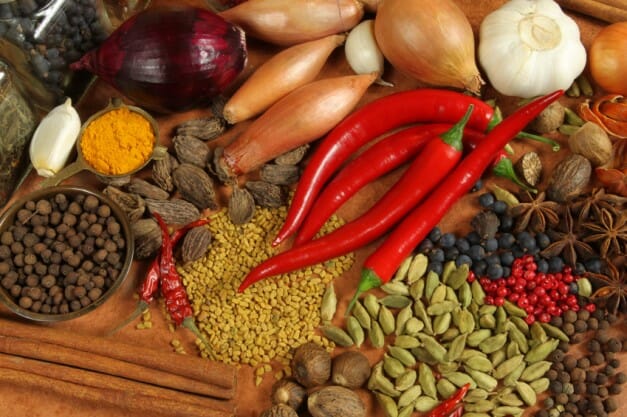Having listened to a thought-provoking nutrition lecture over the weekend on feeding children, I was inspired to share a post I wrote several years ago about the upside to seasoning your child’s plate. Based on the latest research about how we should be feeding kids, it seems more relevant than ever.
When my daughter Isabelle was a baby, I was sharing a meal of Mexican food with relatives who were visiting from out of town. Watching me spoon salsa generously on my enchiladas, my aunt practically slapped the utensil out of my hand. “You can’t eat that, you’re breastfeeding.” She exclaimed. “You’ll make the baby sick.”
You’d have thought I was giving bourbon to my newborn through an IV drip.
I’m all for sage advice from the aunties; they often have the best nuggets of wisdom. But not on this one.
Promoting Adventurous Appetites
I proceeded with my salsa. Not only did Isabelle not get sick, she, along with the two sisters who followed, went onto to develop fairly adventurous palates.
I’ve never really restrained from seasoning the food I cook to accommodate the kids. That’s not to say I recommend serving children vindaloo curries and sushi slathered with wasabi. But I do think it makes sense to take full advantage of the seasonings at your disposal. Expanding your child’s culinary horizons is reason enough to add herbs and spices to food. The healthy benefits of these ingredients are a pleasant side effect.
Nutritional Upsides
Herbs and spices enhance the taste of food without the downsides that accompany other flavor enhancers (fat and sugar, for example). Many seasonings offer untold nutritional benefits as well. Indeed, according to Dr. Andrew Weil, arguably the country’s thought leader on integrative medicine, turmeric, a bright yellow spice common in Indian and other Central Asian cooking, is the most powerful anti-inflammatory we know of. Cinnamon is linked to a decreased risk of heart disease, garlic and onions have anti-inflammatory and antibiotic properties, and ginger can aid with upset tummies. Entire books are devoted to the use of herbs and spices for medicinal purposes, including “Healing Spices”, by Indian biochemist, Bharat B. Aggarwal.
That’s not to say parents need to pump endless spices into your kids, just don’t be shy about seasoning the food you feed your family. Here are some tips that may help:
1. Start Early
If you’re pregnant, eat a varied diet with lots of different tastes. Research shows that a mom’s diet can have an impact on her baby’s palate down the road. Of course it can be tricky to work around the nausea and food intolerances that often accompany pregnancy, but do the best that you can.
2. Know that Breastfeeding Counts
If you are breastfeeding, continue to eat a varied diet. Your infant is picking up and growing accustomed to the foods you ingest, so eat a variety of flavors.
3. Season their Food
Parents often ask, “is it okay to add spices to my baby’s food?” The answer is yes. You’ll want to use some caution with hot chilis and the like, but herbs and spices of all kinds are encouraged.
4. Take it Slow with New Flavors
If you have older kids accustomed to eating their food relatively plain, take baby steps by introducing new seasonings subtly and over time. Eventually they will likely adopt new flavors.
5. Get Them in the Kitchen
The more you can engage your kids in the cooking, the more open they will likely to be to explore new tastes. Consider the spice cabinet just another place to explore and get creative, and let them play.
